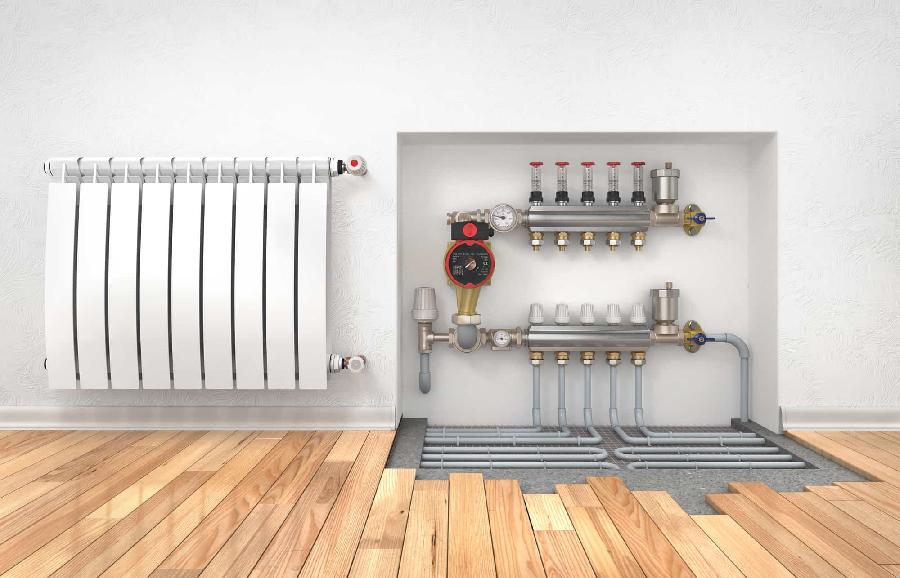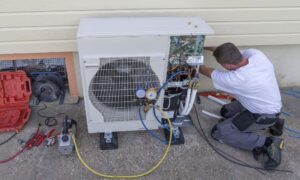
Nothing beats hydronic heating systems when it comes to home heating solutions that keep homes pleasant and warm. These choices, which may keep your house not just warm but also healthy and cool, outperform typical forced-air systems, which are not only wasteful and ineffectual but also harmful to the health of other residents.
The Benefits Of A Hydronic Heating System
Hydronic heating is a low-energy way to heat your home cleanly and comfortably. You will never have to worry about your central heating again because of its proven dependable, adaptable, safe, sustainable, and elegant performance.
The following are some benefits of using hydronic heating systems:
Warm Floors
Radiant flooring maintains the temperature of your floors. That’s particularly wonderful when you first get out of bed on a fresh, cool morning. Warmth is delivered via tubes under the floor, and the floor acts as a conductor to keep stuff warm.
Zones
Hydronic heating systems enable you to generate different heat zones around your house. Rather than using a single thermostat to regulate the whole system, you may adjust the temperature in individual regions or rooms. You don’t have to worry about temperature changes caused by opening and closing doors since there is no cycle of pushing warm air out and drawing air in.
No Ducts
Air ducts and return air systems are not required in hydronic systems. These might take up a lot of space in both ceilings and walls. Retrofitting may be time-consuming and costly if your property does not already have air ducts. Hydronic system tubes may be mounted to floor joists or concealed in walls and routed around existing plumbing.
Humidity Levels
Radiant heat does not cause your property to dry out. Forced air heating systems take moisture from the air, causing humidity imbalances. As a closed system that uses liquid, radiant heat doesn’t alter humidity.
Energy Efficiency
The use of hydronic heating systems is superior to the use of other types of heating.The amount of energy required to heat the water and transfer the heat around the house is reduced. Water also retains heat better than air. Radiant heat systems may save you up to 40% on your heating expenditures.
Quiet
Radiant heating systems are extremely quiet. There is no sound, such as when a furnace begins to operate or the creaks and groans created by warm air travelling through frigid air ducts. You also don’t detect the rush of air produced by forced-air systems.
Warmer Lower Temperatures
Radiant flooring is the warmest closest to the floor, keeping your feet warm. Baseboard radiators are also close to the ground. Therefore, the air is warm where you spend most of your time – seated, standing, or lying down. Also, since hydronic solutions do not evacuate the air, there seems to be no breeze to keep you cool.
Hydronic Heating: How Does It Work?
Because water has greater conductivity levels, hydronic heating works by efficiently transferring heat via this medium. This not only means that less energy is used to heat your house but also that your power costs will be substantially lower.
Heat is transported by pipes placed in the ceiling, walls, or, preferably, under your floor. This energy is subsequently transferred via these surfaces, which transport heat throughout your house using the radiant heating concept. This generates a pleasant environment without any cold patches, which may cause you to feel chilly from time to time.
Given that these systems need a heat source, heat pumps are a popular alternative due to their unique green energy design.
Hydronic Cooling: How Does It Work?
Most people are unaware that hydronic cooling is also a component of hydronic underfloor heating systems.
These systems, which use the same heat transfer mechanism described above, disseminate cold water in the pipes to chill the different surfaces of your house. These technologies, which are more efficient than conventional cooling systems such as air conditioners, keep houses cool and pleasant. Thus, although you may choose these systems mainly for their heating capabilities, hydronic cooling offers a profitable home comfort option for wise consumers.
Forced-air Systems vs. Hydronic Heating Systems: Which One Is Best?
When comparing these two systems, hydronic heating systems always succeed due to their superior energy efficiency, health advantages, design flexibility, cost savings, and comfort levels.
Using these systems, you may have zoned heating control over your house with different thermostats. This enables you to solely heat the occupied area, reducing possible energy waste and increasing your power expenses!
Furthermore, hydronic systems are more successful at maintaining a pleasant and healthy atmosphere. Climate management is constant and effective, with fewer cold patches and draughts. In addition, since no bulky equipment is in sight, these systems enable you to build and decorate your house precisely as you like!
Hydronic heating and cooling solutions are fast becoming a component of many Australian homes. These systems offer more than their price tag in terms of many advantages, providing you with a house worth living in all year.
Equip your house with unrivalled home heating systems that make your area an oasis of joy and happiness by selecting the correct systems and providers.







